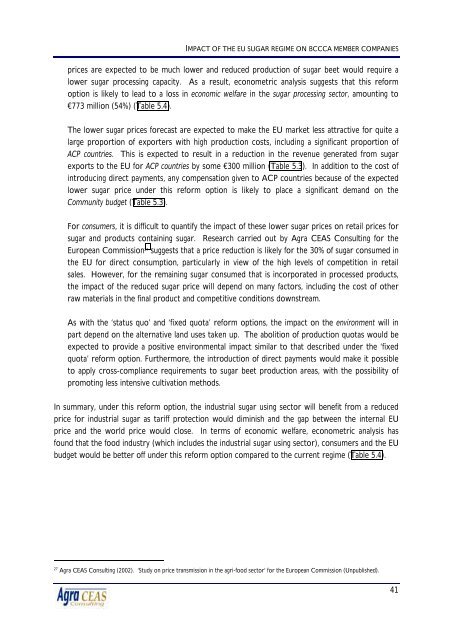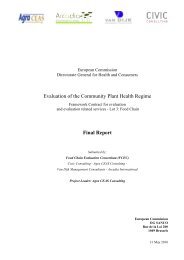2205 final report.pdf - Agra CEAS Consulting
2205 final report.pdf - Agra CEAS Consulting
2205 final report.pdf - Agra CEAS Consulting
Create successful ePaper yourself
Turn your PDF publications into a flip-book with our unique Google optimized e-Paper software.
IMPACT OF THE EU SUGAR REGIME ON BCCCA MEMBER COMPANIES<br />
prices are expected to be much lower and reduced production of sugar beet would require a<br />
lower sugar processing capacity. As a result, econometric analysis suggests that this reform<br />
option is likely to lead to a loss in economic welfare in the sugar processing sector, amounting to<br />
€773 million (54%) (Table 5.4).<br />
The lower sugar prices forecast are expected to make the EU market less attractive for quite a<br />
large proportion of exporters with high production costs, including a significant proportion of<br />
ACP countries. This is expected to result in a reduction in the revenue generated from sugar<br />
exports to the EU for ACP countries by some €300 million (Table 5.3). In addition to the cost of<br />
introducing direct payments, any compensation given to ACP countries because of the expected<br />
lower sugar price under this reform option is likely to place a significant demand on the<br />
Community budget (Table 5.3).<br />
For consumers, it is difficult to quantify the impact of these lower sugar prices on retail prices for<br />
sugar and products containing sugar. Research carried out by <strong>Agra</strong> <strong>CEAS</strong> <strong>Consulting</strong> for the<br />
European Commission 27 suggests that a price reduction is likely for the 30% of sugar consumed in<br />
the EU for direct consumption, particularly in view of the high levels of competition in retail<br />
sales. However, for the remaining sugar consumed that is incorporated in processed products,<br />
the impact of the reduced sugar price will depend on many factors, including the cost of other<br />
raw materials in the <strong>final</strong> product and competitive conditions downstream.<br />
As with the ‘status quo’ and ‘fixed quota’ reform options, the impact on the environment will in<br />
part depend on the alternative land uses taken up. The abolition of production quotas would be<br />
expected to provide a positive environmental impact similar to that described under the ‘fixed<br />
quota’ reform option. Furthermore, the introduction of direct payments would make it possible<br />
to apply cross-compliance requirements to sugar beet production areas, with the possibility of<br />
promoting less intensive cultivation methods.<br />
In summary, under this reform option, the industrial sugar using sector will benefit from a reduced<br />
price for industrial sugar as tariff protection would diminish and the gap between the internal EU<br />
price and the world price would close. In terms of economic welfare, econometric analysis has<br />
found that the food industry (which includes the industrial sugar using sector), consumers and the EU<br />
budget would be better off under this reform option compared to the current regime (Table 5.4).<br />
27<br />
<strong>Agra</strong> <strong>CEAS</strong> <strong>Consulting</strong> (2002). ‘Study on price transmission in the agri-food sector’ for the European Commission (Unpublished).<br />
41













